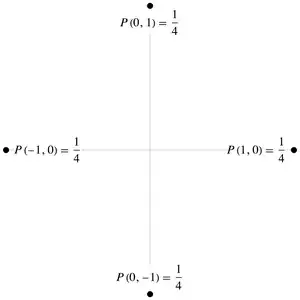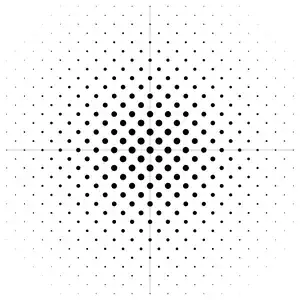In summary, $(3)$ gives the exact answer, but is harder to compute, and $(5)$ gives a normal approximation to the exact probability distribution.
Convolution
The distribution of the terminal position after $n$ moves is an $n$-fold convolution of the distribution of one move. In $2$ dimensions, this is:

In any dimension, odd $n$ distributes the probability to points whose coordinates have an odd sum (the origin is therefore not included). For example, in $2$ dimensions, for $n=63$:

In any dimension, even $n$ distributes the probability to points whose coordinates have an even sum (the origin is therefore included). For example, in $2$ dimensions, for $n=64$:

In the last two diagrams, the area of the dot is proportional to the number of paths ending at that location.
Exact Summation
In the following, $k$ and $p$ are $d$-dimensional multi-indices, $p$ representing the destination position (starting from $0$), and $n=|p+2k|$ is the number of moves to reach the destination (in each of the $d$ dimensions, this means $p+k$ moves toward the destination, and $k$ moves away). Since the components of a multi-index are non-negative, and the number of paths to $(4,-2,6)$ and $(4,2,6)$ are equal, the components of $p$ are the absolute values of the components of the Cartesian position.
Recall that for a $d$-dimensional multi-index $p$, $|p|=\sum\limits_{j=1}^dp_j$ and $p!=\prod\limits_{j=1}^dp_j!$
The number of ways to intersperse the moves along the different axes is
$$
\frac{n!}{n_1!n_2!\cdots n_d!}=\frac{|p+2k|!}{(p+2k)!}\tag1
$$
where $n_j=p_j+2k_j$ is the number of moves along axis $j$.
Once we have decided on the way the moves along the different axes are to be interspersed, along axis $j$, there are $\frac{(p_j+2k_j)!}{(p_j+k_j)!\,k_j!}$ ways to arrange the $p_j+k_j$ forward and $k_j$ backward moves. Taking the product across all the axes, we get
$$
\prod_{j=1}^d\frac{(p_j+2k_j)!}{(p_j+k_j)!\,k_j!}=\frac{(p+2k)!}{(p+k)!\,k!}\tag2
$$
Thus, when $n\ge|p|$ and $2\mid n-|p|$, we get the total number of paths to be
$$
\sum_{|k|=\frac{n-|p|}2}\frac{|p+2k|!}{(p+2k)!}\frac{(p+2k)!}{k!\,(p+k)!}=\bbox[5px,border:2px solid #C0A000]{\sum_{|k|=\frac{n-|p|}2}\frac{n!}{k!\,(p+k)!}}\tag3
$$
out of $(2d)^n$ possible paths.
If $n\lt|p|$ or $2\nmid n-|p|$, then there can be no path to $p$ of length $n$.
Formula $(3)$ is exact, but takes a bit of work to compute. Here are some notes to make the computation more palatable.
Generating Multi-Indices
The difficult part of computing the sum in $(3)$ is generating all the multi-indices. For dimension $d$ multi-indices $p$ so that $|p|=m$, this can be done in the following manner:
Initial multi-index: Start with $p_1=m$ and $p_j=0$ for $1\lt j\le d$.
Subsequent multi-index: Find the lowest order non-zero index, $p_j=a\ne0$. Increment the next index $p_{j+1}=p_{j+1}+1$, set $p_j=0$, and set $p_1=a-1$ (in the case that $j=1$, this simply increments $p_2$ and decrements $p_1$). This process terminates when the lowest order non-zero index is $p_d$ (which would require incrementing $p_{d+1}$).
For example: $d=3$ and $|p|=5$
$$
\begin{array}{|c|c|}
p_1&p_2&p_3\\
\hline
5&0&0\\
4&1&0\\
3&2&0\\
2&3&0\\
1&4&0\\
0&5&0\\
4&0&1
\end{array}\qquad
\begin{array}{|c|c|}
p_1&p_2&p_3\\
\hline
3&1&1\\
2&2&1\\
1&3&1\\
0&4&1\\
3&0&2\\
2&1&2\\
1&2&2
\end{array}\qquad
\begin{array}{|c|c|}
p_1&p_2&p_3\\
\hline
0&3&2\\
2&0&3\\
1&1&3\\
0&2&3\\
1&0&4\\
0&1&4\\
0&0&5
\end{array}
$$
We can use the table generated above and $(3)$ to compute the number of paths to $(0,0,1)$ of length $11$:
$$
\begin{align}
&\phantom{\,+\,}\frac{11!}{(5!0!0!)(5!0!1!)}+\frac{11!}{(4!1!0!)(4!1!1!)}+\frac{11!}{(3!2!0!)(3!2!1!)}\\
&+\frac{11!}{(2!3!0!)(2!3!1!)}+\frac{11!}{(1!4!0!)(1!4!1!)}+\frac{11!}{(0!5!0!)(0!5!1!)}\\
&+\frac{11!}{(4!0!1!)(4!0!2!)}+\frac{11!}{(3!1!1!)(3!1!2!)}+\frac{11!}{(2!2!1!)(2!2!2!)}\\
&+\frac{11!}{(1!3!1!)(1!3!2!)}+\frac{11!}{(0!4!1!)(0!4!2!)}+\frac{11!}{(3!0!2!)(3!0!3!)}\\
&+\frac{11!}{(2!1!2!)(2!1!3!)}+\frac{11!}{(1!2!2!)(1!2!3!)}+\frac{11!}{(0!3!2!)(0!3!3!)}\\
&+\frac{11!}{(2!0!3!)(2!0!4!)}+\frac{11!}{(1!1!3!)(1!1!4!)}+\frac{11!}{(0!2!3!)(0!2!4!)}\\
&+\frac{11!}{(1!0!4!)(1!0!5!)}+\frac{11!}{(0!1!4!)(0!1!5!)}+\frac{11!}{(0!0!5!)(0!0!6!)}\\[6pt]
&=5416026
\end{align}
$$
out of $6^{11}=362797056$ paths of length $11$.
Normal Approximation
In $\mathbb{Z}^d$, the variance of one move is $\frac1d$. Thus, the variance after $n$ moves would be $\frac nd$. Therefore, the normal approximation would be
$$
\left(\frac{d}{2\pi n}\right)^{d/2}e^{-\frac{d}{2n}|x|^2}\tag4
$$
Since the distribution is concentrated only on points where the sum of the components have the same parity as $n$, the distribution should be doubled on those points and zeroed out on the others:
$$
\bbox[5px,border:2px solid #C0A000]{\left(1+(-1)^{n-|p|}\right)\left(\frac{d}{2\pi n}\right)^{d/2}e^{-\frac{d}{2n}\|p\|^2}}\tag5
$$
where $\|p\|^2=\sum\limits_{j=1}^dp_j^2$ is Euclidean length.
Comparison of the Approaches
$\boldsymbol{n=20}$, $\boldsymbol{d=3}$, and $\boldsymbol{p=(4,2,6)}$:
Formula $(3)$ says the number of paths is $383669852280$ out of the $6^{20}=3656158440062976$ possibilities, giving a probability of
$$
\frac{383669852280}{3656158440062976}=\color{#C00}{0.00010493797}\tag6
$$
Formula $(5)$ says that the probability is approximately
$$
2\,\left(\frac3{2\pi\cdot20}\right)^{3/2}e^{-\frac3{2\cdot20}\left(4^2+2^2+6^2\right)}=\color{#C00}{0.00011062678}\tag7
$$
$\boldsymbol{n=50}$, $\boldsymbol{d=2}$, and $\boldsymbol{p=(5,7)}$:
Formula $(3)$ says the number of paths is $3695801675367562256810160000$ out of the $4^{50}=1267650600228229401496703205376$ possibilities, giving a probability of
$$
\frac{3695801675367562256810160000}{1267650600228229401496703205376}=\color{#090}{0.0029154735}\tag8
$$
Formula $(5)$ says that the probability is approximately
$$
2\,\left(\frac2{2\pi\cdot50}\right)^{2/2}e^{-\frac2{2\cdot50}\left(5^2+7^2\right)}=\color{#090}{0.0028983731}\tag9
$$
$\boldsymbol{n=100}$, $\boldsymbol{d=5}$, and $\boldsymbol{p=(3,2,3,1,1)}$:
Formula $(3)$ says the probability is
$$
\tiny\frac{61550621582025061045069636484697057343625580855166277017112361105163380678323254176105096000000}{10^{100}}\\=\color{#00F}{6.1550622\times10^{-6}}\tag{10}
$$
Formula $(5)$ says that the probability is approximately
$$
2\,\left(\frac5{2\pi\cdot100}\right)^{5/2}e^{-\frac5{2\cdot100}\left(3^2+2^2+3^2+1^2+1^2\right)}=\color{#00F}{6.2005276\times10^{-6}}\tag{11}
$$


